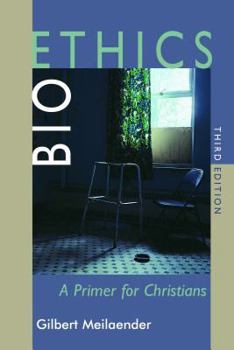Bioethics: A Primer for Christians, Third Edition
Select Format
Select Condition 
Book Overview
In the face of continuing advances in medical research and treatment, bioethics remains a serious ongoing social concern. For nearly two decades Gilbert Meilaender's Bioethics has offered discerning Christian guidance on a wide range of pressing issues in medical ethics. Now in its third edition, Meilaender's Bioethics covers abortion, assisted reproduction, genetic research, suicide and euthanasia, human experimentation -- and much more -- in language that is theologically informed, straightforward, and clear. This new edition includes updated information throughout and an added discussion of the need to protect Christian conscience in the practice of medicine.
Format:Paperback
Language:English
ISBN:0802867707
ISBN13:9780802867704
Release Date:January 2013
Publisher:William B. Eerdmans Publishing Company
Length:152 Pages
Weight:0.52 lbs.
Dimensions:0.5" x 5.9" x 8.9"
Customer Reviews
3 ratings
Bioethics: A Primer for Christians
Published by Thriftbooks.com User , 20 years ago
In recent times, with the advances in human reproductive technologies, cloning, organ transplants, contraceptive technologies, and abortifacients, it is necessary to provide clear moral answers to these ethical questions that face medical science today. The author's book provides an ethic based on Christian principles. The author does this by looking at life as a gift from God. The first chapter of the book describes the basic elements in the Christian vision of the world. Christians in baptism are called to be members of the body of Christ. They are called to form a bond with each other; they are called into a community. Christians are created in freedom for communion with God. This freedom has its limits. In chapters two through four, he argues that parenthood does not mean a right to have a child. The child is begotten and not made. Parents must not seek to have a child at all cost, not even in adoption. On abortion, the author argues that the life of the child in the womb is God's creation and is part of the world God came to redeem. Chapters five and six discuss genetic advances and pre-natal screening. Gene type therapy makes children that come after us the products that we have molded. Pre-natal screening tends to separate the natural connection between mother and child and making parental commitment to offspring tentative and conditional. In chapters six through eight, the author says suicide and euthanasia are attempts at being creators rather than creatures. Creatures do not have the ultimate judgment about a person. Christians have the responsibility of standing with the suffering to give them care and not minimize suffering. However, refusing a useless and excessively burdensome treatment is not immoral. Patients need to know the truth and to participate in the decision making process. Living wills and health care power of the attorney are helpful where the patient is incapable of making a decision. Chapters nine and ten discuss two gifts of the body, organ donation and human experimentation. Every gift of the body can be well given if a person understands him or herself as a gift rather than creators. People must freely and voluntarily give their consent in order to participate in medical research. In the last chapter, the author discusses sickness and health. God is present in our illnesses and Christians must continue to live in this hope. Physicians ought not to see themselves as saviors but must cooperate with powers beyond theirs. The author made logical and consistent arguments throughout the book. He supports his thesis with authoritative facts drawn from social events, medical advance and reputable authors. His style of writing is simple and devoid of words that will confuse the average reader. The major weakness with the book is the failure to give a more pastoral twist. The treatment of life's starting point is vague. I highly recommend this book to anyone who desires knowing more about biomedical ethics and e
Delivers what it promises: primer on bioethics
Published by Thriftbooks.com User , 23 years ago
No pretenses about this book, upfront and straightforward that this is a primer on bioethics from a conservative Christian perspective.He does a great job meeting his promises, providing intros to the topics of assisted reproduction, abortion, gene therapy, genetic research, prenatal screeening, suicide and euthanasia, organ donation, and research sensitive issues to humans.He is unapologetic for not providing a survey of Christian opinions nor for trying to be faithful to his understanding (Lutheran) of Biblical truths. He is sensitive in providing not a minimalistic, common denominator, public policy view, but one that is sensitive to the pro-life, Creator God who sustains all and will judge us at the end.Possibly the only improvement I can see is the lack of a recommended reading list for those interested in pursuing topics further without reading journals, etc.This book shall bless the church both in indiviudal Christians reading it and also for Bible study groups.
Review
Published by Thriftbooks.com User , 24 years ago
This book is an overview, from a Christian perspective, of some of the current issues in clinical ethics or bioethics. While Dr Meilanader's viewpoint may differ significantly from that of many evangelical Christians or Catholics, his application of Christian principles to bioethical questions is very well done. I would strongly recommend this book to those interested in beginning to learn about issues in bioethics with a particular emphasis on the Christian perspective. For those interested in a deeper look at the issues, this book would serve only as an introduction.






